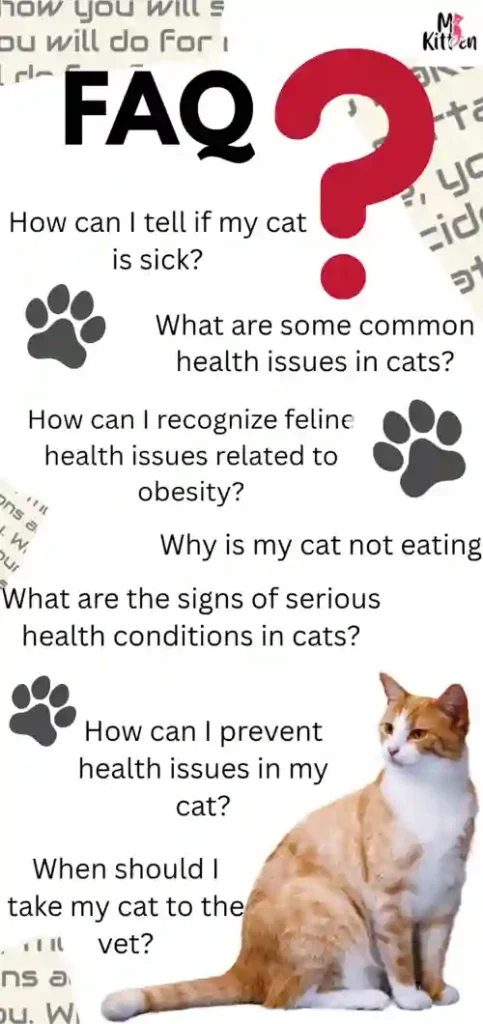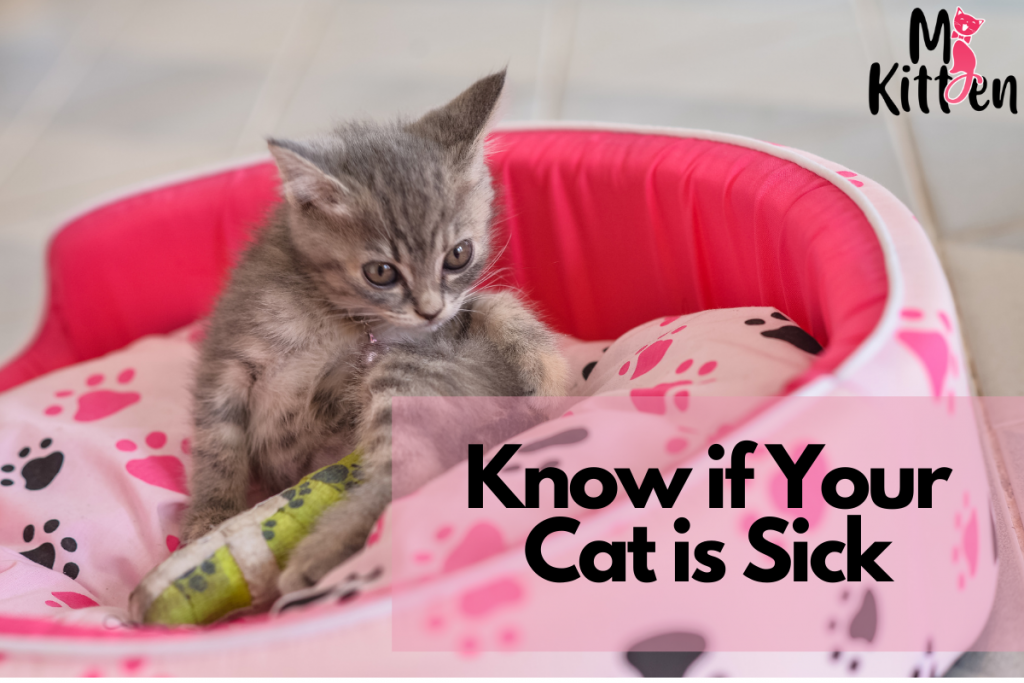Is Your Cat Sick? Here's How to Tell
Recognizing the Early Signs of Illness :How to Tell If Your Cat Is Unwell?
As a cat owner, it’s natural to be concerned about your feline friend’s health. Cats often hide signs of illness, making it challenging to determine if they’re unwell.
Changes in behavior or appetite can be indicative of an underlying issue. So, how can you identify if your cat is acting differently?
Recognizing early signs of illness is crucial to providing timely care. By being aware of the common signs and symptoms, you can take the first step in ensuring your cat receives the necessary attention.
Paws and Reflect: Is Your Cat Feeling Under the Weather?
How to Know if Your Cat is Sick: Behavioral Signs
If your cat is acting strangely, it may be a sign that they’re unwell. Cats often exhibit behavioral changes when they’re sick, and being aware of these signs can help you identify potential health issues early on.
Lethargy vs. Normal Rest
Cats are known for their love of sleep, but there’s a difference between normal rest and lethargy. If your cat is sleeping more than usual or seems lethargic, it could be a sign of illness. Monitor your cat’s activity levels and consult a veterinarian if you notice any unusual changes.
A decrease in playfulness can be a sign that your cat is not feeling well. Cats often lose interest in activities they normally enjoy when they’re sick or in pain. If your cat is showing less enthusiasm for play or seems disinterested in their surroundings, it’s worth investigating further.
Excessive Hiding or Clinginess
Cats often hide when they’re feeling vulnerable or scared, but excessive hiding can be a sign of illness. On the other hand, some cats may become more clingy or demanding of attention when they’re not feeling well. Be aware of any changes in your cat’s behavior and consult a veterinarian if you’re concerned.
Unexpected Aggression
If your cat is displaying unexpected aggression, such as hissing, growling, or swatting, it could be a sign of pain or discomfort. Cats often become aggressive when they’re feeling unwell, so it’s essential to monitor their behavior and seek veterinary care if you notice any unusual aggression.
By being aware of these behavioral signs, you can help identify potential health issues in your cat and seek timely veterinary care. Remember, every cat is different, and what may be normal for one cat may not be normal for another. If you’re ever in doubt about your cat’s health, it’s always best to consult with a veterinarian.
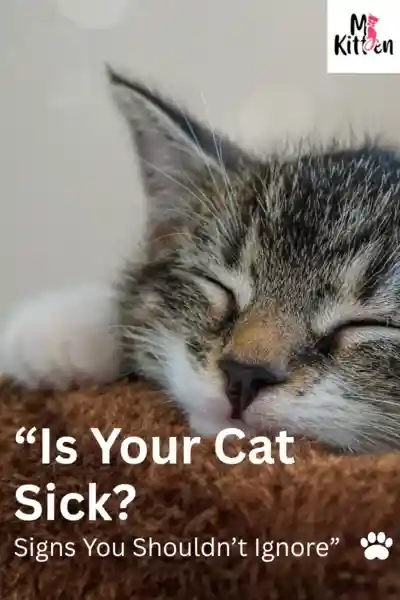
Is My Cat is Acting Differently?
Look for their uncommon behaviors, sick cats often lie quietly in a hunched position. They stop grooming themselves, they may purr due to extreme pain which anyone can confuse with their happiness. Sometimes cats sleep with their head raised as they have difficulty breathing while sleeping due to respiratory problems. Cats with neurological problems may be confused, have seizures, or prolong press their heads into furniture or walls, it may be due to headaches that be unbearable for them.
Less bodily Movements:
Don’t confuse your cat’s health with old age cats as old cats ignore to do activities due to arthritis and other age-related problems. Notice if your cat has recently changed her activities and not jumping up on the counters or running around after her fav toys like she usually does, she may be experiencing joint problems.
Changes in Grooming Habits:
Look for signs of excessive itching or licking in addition to shedding or hair loss. Notice if your cat has suddenly stopped grooming, as poor grooming habits can indicate systemic diseases. The dry, old, or lusterless coat can be a clear sign of some larger issues.
Unusual Bowel Movements:
You can detect diseases with respect to your cat’s stools, large or more frequent stools can be a sign of an internal disease, bloody stools are to be addressed immediately to the vet for proper treatment and care.
Change in Behavior:
There are behavioral changes in cats with hyperthyroidism, systemic changes like over revelry may one of the signs whereas over fearful and any major change in the behavior may also be a sign of concern.
Increased Hairballs or Vomit:
Vomiting along with hairballs is a common symptom of heartworms, these are some serious issues and can be life-threatening same as with fleas. Else, vomiting alone can also be a gastrointestinal problem and must be treated.

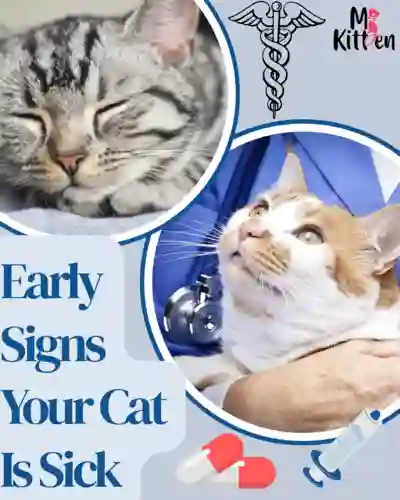
Why Your Cat Isn't Eating: Causes and Solutions
Loss of appetite in cats is a common concern that can stem from various health problems. Cats are known for their finicky eating habits, but a persistent decrease in appetite can be a sign of an underlying issue that needs attention.
If your cat isn’t eating, it’s crucial to identify the cause. Several factors can contribute to this behavior, including health issues that may require veterinary care for cats.
Dental Problems and Oral Pain
Dental problems are a common cause of decreased appetite in cats. Oral pain due to dental issues such as gum disease, tooth abscesses, or tooth resorption can make eating uncomfortable or painful.
Regular dental check-ups are a vital part of cat health tips. Ensuring your cat’s teeth and gums are healthy can prevent eating issues.
Gastrointestinal problems, including inflammatory bowel disease, gastrointestinal foreign bodies, or food allergies, can also lead to a decrease in appetite.
These issues can cause discomfort, nausea, or pain, making your cat less inclined to eat. Veterinary care for cats is essential in diagnosing and treating these conditions.
Signs of Dangerous Weight Loss
Weight loss in cats can be a sign of a serious health issue. Monitoring your cat’s weight and overall health is crucial.
If your cat is losing weight due to a lack of appetite, it’s vital to seek veterinary care to address the underlying cause.
Obesity Concerns in Indoor Cats
On the other hand, obesity is also a significant concern, particularly in indoor cats. Lack of exercise and overfeeding can lead to obesity, which can cause a range of health problems.
Maintaining a healthy weight through a balanced diet and regular exercise is one of the key cat health tips for indoor cats.
In conclusion, a decrease in appetite in cats can be due to various reasons, ranging from dental issues to gastrointestinal problems, and even obesity concerns. Understanding these causes and following cat health tips can help you maintain your cat’s health and know when to seek veterinary care for cats.
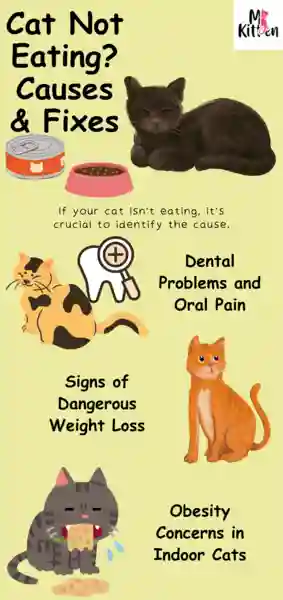
Some other serious conditions
Cats and kitten living with other cats or animals are prone to ear mites, But if your cat is a total domestic one and also having ear mites, then it must be treated asap. Bring her to our veterinarian for an examination and prescription of an appropriate treatment rather than purchasing a store-bought treatment. Always Remember cats should only be given cat-specific flea and tick prevention treatments as dog-formulated medication can make a cat sick.
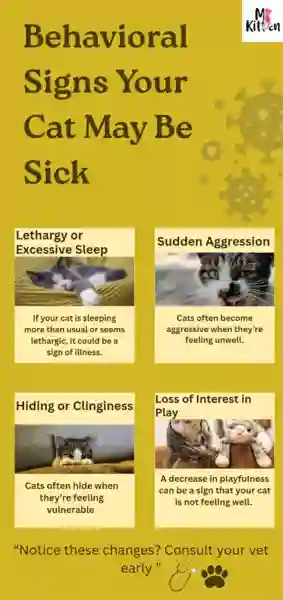
Recognizing Serious Health Conditions in Indian Cats
Recognizing serious health conditions in cats is crucial for their well-being, especially in India’s diverse climate. Cat owners should be vigilant about various health issues that can affect their pets.
Parasitic Infections
Parasitic infections are a significant concern for cat health in India. Fleas, ticks, and worms can cause discomfort and transmit diseases. Regular checks and preventive measures, such as flea control medications and deworming, are essential.
Heat-Related Illnesses
India’s hot climate makes heat-related illnesses a risk for cats. Symptoms include panting, drooling, and lethargy. Keeping your cat cool, hydrated, and indoors during the hottest parts of the day can help prevent these conditions.
Respiratory distress in cats can be caused by infections, allergies, or heart disease. Signs include rapid breathing, coughing, and wheezing. Immediate veterinary care is necessary if you observe these symptoms.
Severe Vomiting or Diarrhea
Severe vomiting or diarrhea can lead to dehydration and electrolyte imbalances in cats. If your cat experiences persistent or severe gastrointestinal symptoms, seek veterinary attention promptly.
Abnormal Discharge or Swelling
Abnormal discharge or swelling in cats can indicate infections or other serious conditions. Eye or nasal discharge, swelling of the face or limbs, and other unusual signs should be evaluated by a veterinarian.
Skin Problems and Coat Changes
Skin problems and coat changes can be signs of allergies, parasites, or nutritional deficiencies. Monitoring your cat’s skin and coat health and consulting a veterinarian if you notice any unusual changes is crucial.
Being aware of these serious health conditions and knowing when to seek veterinary care can significantly improve your cat’s health outcomes. Regular check-ups and a keen observation of your cat’s behavior and health can help in early detection and treatment.
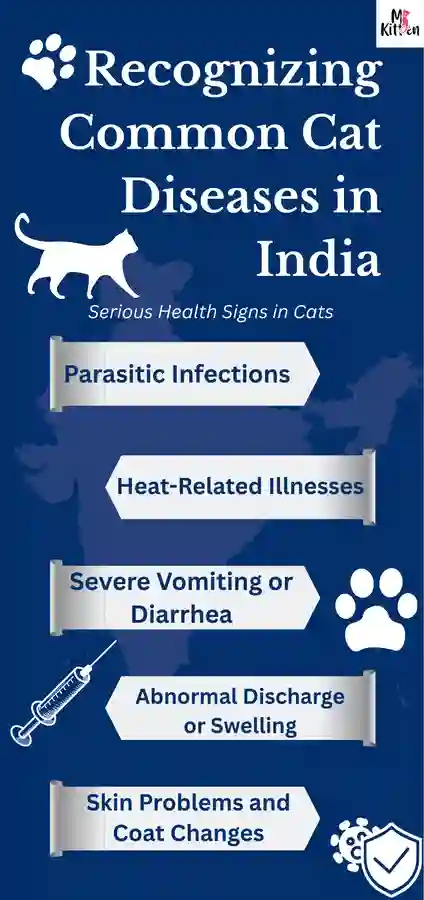
Conclusion: When to Visit the Veterinarian
Recognizing the signs of illness in your cat is crucial for maintaining their health and addressing common cat health issues effectively. By being aware of changes in behavior, appetite, and physical condition, you can identify potential health problems early on.
If your cat exhibits persistent or severe symptoms such as loss of appetite, vomiting, diarrhea, or lethargy, it is essential to seek professional veterinary care. Early detection and appropriate treatment can significantly improve your cat’s chances of recovery and overall well-being.
Regular check-ups with a veterinarian can also help prevent and detect health issues before they become severe. By staying informed and vigilant, you can ensure your cat receives the care they need to thrive.
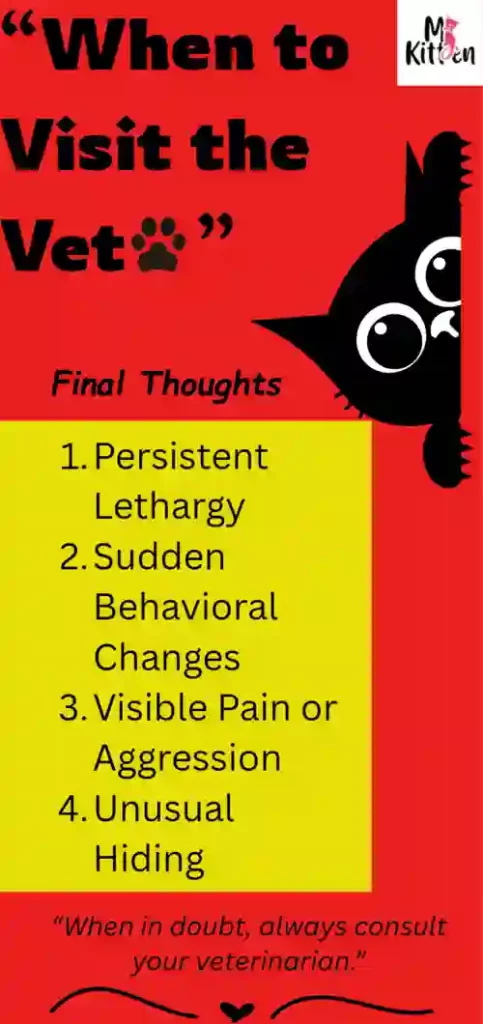
FAQ
How can I tell if my cat is sick?
What are some common health issues in cats?
Why is my cat not eating?
How can I prevent health issues in my cat?
When should I take my cat to the vet?
What are the signs of serious health conditions in cats?
How can I recognize feline health issues related to obesity?
What are the risks associated with heat-related illnesses in cats?
